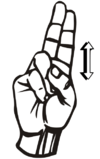Definify.com
Webster 1913 Edition
O
O
(ō)
. 1.
O, the fifteenth letter of the English alphabet, derives its form, value, and name from the Greek O, through the Latin. The letter came into the Greek from the Phœnician, which possibly derived it ultimately from the Egyptian. Etymologically, the letter o is most closely related to a, e, and u; as in E. bone, AS. bān; E. stone, AS. stān; E. broke, AS. brecan to break; E. bore, AS. beran to bear; E. dove, AS. dūfe; E. toft, tuft; tone, tune; number, F. nombre.
The letter o has several vowel sounds, the principal of which are its long sound, as in bone, its short sound, as in nod, and the sounds heard in the words orb, son, do (feod), and wolf (book). In connection with the other vowels it forms several digraphs and diphthongs. See Guide to Pronunciation , §§ 107-129.2.
Among the ancients, O was a mark of triple time, from the notion that the ternary, or number 3, is the most perfect of numbers, and properly expressed by a circle, the most perfect figure.
O was also anciently used to represent 11: with a dash over it (Ō), 11,000. O
(ō)
, Noun.
pl.
O’s
or Oes
(ōz)
. 1.
The letter O, or its sound.
“Mouthing out his hollow oes and aes.” Tennyson.
2.
Something shaped like the letter O; a circle or oval.
“This wooden O [Globe Theater]”. Shak.
3.
A cipher; zero.
[R.]
Thou art an
O
without a figure. Shakespeare
O
(ō)
, int
erj.
An exclamation used in calling or directly addressing a person or personified object; also, as an emotional or impassioned exclamation expressing pain, grief, surprise, desire, fear, etc.
For ever,
O
Lord, thy word is settled in heaven. Ps. cxix. 89.
O
how love I thy law ! it is my meditation all the day. Ps. cxix. 97.
☞ O is frequently followed by an ellipsis and that, an in expressing a wish: “O [I wish] that Ishmael might live before thee!”
Gen. xvii. 18
; or in expressions of surprise, indignation, or regret: “O [it is sad] that such eyes should e'er meet other object!” Sheridan Knowles.
☞ A distinction between the use of O and oh is insisted upon by some, namely, that O should be used only in direct address to a person or personified object, and should never be followed by the exclamation point, while Oh (or oh) should be used in exclamations where no direct appeal or address to an object is made, and may be followed by the exclamation point or not, according to the nature or construction of the sentence. Some insist that oh should be used only as an interjection expressing strong feeling. The form O, however, is, it seems, the one most commonly employed for both uses by modern writers and correctors for the press. “O, I am slain!”
Shak.
“O what a fair and ministering angel!” “O sweet angel !” Longfellow.
O
for a kindling touch from that pure flame! Wordsworth.
But she is in her grave, – and
The difference to me!
oh
The difference to me!
Wordsworth.
Oh
for a lodge in some vast wilderness! Cowper.
We should distinguish between the sign of the vocative and the emotional interjection, writing
O
for the former, and oh
for the latter. Earle.
O dear
, and
O dear me!
[corrupted fr. F.
, O Dieu!
or It. O Dio!
O God! O Dio mio!
O my God! Wyman
.]exclamations expressive of various emotions, but usually promoted by surprise, consternation, grief, pain, etc.
Webster 1828 Edition
O
O
is the fifteenth letter, and the fourth vowel in the English Alphabet. The shape of this letter seems to have been taken from the circular configuration of the lips in uttering the sound. It corresponds in figure with the Coptic O, and nearly with the Syriac initial and final vau, and the Ethiopic ain. In words derived from the oriental languages, it often represents the vau of those languages, and sometimes the ain; the original sound of the latter being formed deep in the throat, and with a greater aperture of the mouth.In English, O has a long sound, as in tone, hone, groan, cloke, roll, droll; a short sound, as in lot plod, rod, song, lodge. The sound of oo is shortened in words ending in a close articulation, as in book and foot.
The long sound of O, is usually denoted by e, at the end of a word or syllable, as in bone, lonely; or by a servile a, as in moan, foal. It is generally long before ll, as in roll; but it is short in doll, loll, and in words of more syllables than one, as in folly, volley.
As a numeral, O was sometimes used by the ancients for 11, and with a dash over it for 11,000.
Among the ancients, O was a mark of tripe time, from the notion that the ternary or number 3, is the most perfect of numbers, and properly expressed by a circle, the most perfect figure.
O
is often used as an exclamation, expressing a wish.O
, were he present.It sometimes expresses surprise. Shakespeare uses O for a circle or oval.
Within this wooden O.
Definition 2026
Ö
Ö
 | ||||||
Composition: O [U+004F] + ̈ [U+0308]
| ||||||
|---|---|---|---|---|---|---|
See also: Appendix:Variations of "o"
Translingual
Letter
Ö upper case (lower case ö)
See also
- (Latin script): Aa Bb Cc Dd Ee Ff Gg Hh Ii Jj Kk Ll Mm Nn Oo Pp Qq Rr Sſs Tt Uu Vv Ww Xx Yy Zz
- (Variations of letter O): Óó Òò Ŏŏ Ôô Ốố Ồồ Ỗỗ Ổổ Ǒǒ Öö Ȫȫ Őő Õõ Ṍṍ Ṏṏ Ȭȭ Ȯȯ Ȱȱ Øø Ǿǿ Ǫǫ Ǭǭ Ōō Ṓṓ Ō̂ō̂ Ṑṑ Ỏỏ Ȍȍ Ȏȏ Ơơ Ớớ Ờờ Ỡỡ Ởở Ợợ Ọọ Ộộ Ɵɵ ⱺ ᴏ Oo Ꜵꜵ Œœ Ꝏꝏ Ꝍꝍ Ȣȣ
- (Letters using umlaut or diaresis sign): Ää Ǟǟ Ëë Ḧḧ Ïï Ḯḯ N̈n̈ Öö Ȫȫ Ṏṏ ẗ Üü Ǘǘ Ǚǚ Ǜǜ Ǖǖ Ṻṻ Ṳṳ Ẅẅ Ẍẍ Ÿÿ
Azeri
Letter
Ö upper case (lower case ö)
See also
- (Latin script letters) hərf; Aa, Bb, Cc, Çç, Dd, Ee, Əə, Ff, Gg, Ğğ, Hh, Xx, Iı, İi, Jj, Kk, Qq, Ll, Mm, Nn, Oo, Öö, Pp, Rr, Ss, Şş, Tt, Uu, Üü, Vv, Yy, Zz
Finnish
Letter
Ö (upper case, lower case ö)
Derived terms
See also
- (Latin script letters) letter; Aa, Bb, Cc, Dd, Ee, Ff, Gg, Hh, Ii, Jj, Kk, Ll, Mm, Nn, Oo, Pp, Qq, Rr, Ss, Šš, Tt, Uu, Vv, Ww, Xx, Yy, Zz, Žž, Åå, Ää, Öö
ö
ö
Composition: o [U+006F] + ̈ [U+0308]
| ||||||
|---|---|---|---|---|---|---|
See also: Appendix:Variations of "o"
Translingual
Letter
ö lower case (upper case Ö)
See also
- (Latin script): Aa Bb Cc Dd Ee Ff Gg Hh Ii Jj Kk Ll Mm Nn Oo Pp Qq Rr Sſs Tt Uu Vv Ww Xx Yy Zz
- (Variations of letter O): Óó Òò Ŏŏ Ôô Ốố Ồồ Ỗỗ Ổổ Ǒǒ Öö Ȫȫ Őő Õõ Ṍṍ Ṏṏ Ȭȭ Ȯȯ Ȱȱ Øø Ǿǿ Ǫǫ Ǭǭ Ōō Ṓṓ Ō̂ō̂ Ṑṑ Ỏỏ Ȍȍ Ȏȏ Ơơ Ớớ Ờờ Ỡỡ Ởở Ợợ Ọọ Ộộ Ɵɵ ⱺ ᴏ Oo Ꜵꜵ Œœ Ꝏꝏ Ꝍꝍ Ȣȣ
- (Letters using umlaut or diaresis sign): Ää Ǟǟ Ëë Ḧḧ Ïï Ḯḯ N̈n̈ Öö Ȫȫ Ṏṏ ẗ Üü Ǘǘ Ǚǚ Ǜǜ Ǖǖ Ṻṻ Ṳṳ Ẅẅ Ẍẍ Ÿÿ
Azeri
Letter
ö lower case (upper case Ö)
See also
- (Latin script letters) hərf; Aa, Bb, Cc, Çç, Dd, Ee, Əə, Ff, Gg, Ğğ, Hh, Xx, Iı, İi, Jj, Kk, Qq, Ll, Mm, Nn, Oo, Öö, Pp, Rr, Ss, Şş, Tt, Uu, Üü, Vv, Yy, Zz
Swedish
Pronunciation
- Rhymes: -øː
- Letter name
- IPA(key): /øː/
- Phoneme
- IPA(key): /øː/, /œ/
Etymology 1
Letter
ö (lower case, upper case Ö)
- The last letter of the Swedish alphabet, pronunced /øː/ when long, /œ/ when short, [œ̞ː] when long and before r, and [œ̞] when short and before r.
- Det är två ön i "Höör".
- There are two ö in "Höör".
- Det är två ön i "Höör".
Declension
| Inflection of ö | ||||
|---|---|---|---|---|
| Singular | Plural | |||
| Indefinite | Definite | Indefinite | Definite | |
| Nominative | ö | öet | ön | öna |
| Genitive | ös | öets | öns | önas |
Etymology 2
From Old Swedish ø, from Old Norse ey, from Proto-Germanic *awjō, from Proto-Indo-European *h₂ekʷeh₂ (“water”). Cognate with å (“stream”).
Noun
ö c
- an island
- Gotland är den största ön i Östersjön.
- Gotland is the largest island in the Baltic Sea.
- Gotland är den största ön i Östersjön.
Declension
| Inflection of ö | ||||
|---|---|---|---|---|
| Singular | Plural | |||
| Indefinite | Definite | Indefinite | Definite | |
| Nominative | ö | ön | öar | öarna |
| Genitive | ös | öns | öars | öarnas |
Compounds
See also
Turkish
Letter
ö (lower case, upper case Ö)
See also
- (Latin script letters) harf; Aa, Bb, Cc, Çç, Dd, Ee, Ff, Gg, Ğğ, Hh, Iı, İi, Jj, Kk, Ll, Mm, Nn, Oo, Öö, Pp, Rr, Ss, Şş, Tt, Uu, Üü, Vv, Yy, Zz
Noun
ö
See also
- (Latin script letter names) harf; a, be, ce, çe, de, e, fe, ge, yumuşak ge, he, ı, i, je, ke, le, me, ne, o, ö, pe, re, se, şe, te, u, ü, ve, ye, ze (Category: tr:Latin letter names)
Turkmen
Pronunciation
- (phoneme) IPA(key): /ø/, /øː/
Letter
ö (upper case Ö)
See also
- (Latin script letters) harp; Aa, Bb, Çç, Dd, Ee, Ää, Ff, Gg, Hh, Ii, Jj, Žž, Kk, Ll, Mm, Nn, Ňň, Oo, Öö, Pp, Rr, Ss, Şş, Tt, Uu, Üü, Ww, Yy, Ýý, Zz,
Veps
Etymology
From Proto-Finnic *öö, from Proto-Finno-Ugric *üje.
Noun
ö
Inflection
| Inflection of ö | |||
|---|---|---|---|
| nominative sing. | ö | ||
| genitive sing. | ön | ||
| partitive sing. | öd | ||
| partitive plur. | öid | ||
| singular | plural | ||
| nominative | ö | öd | |
| accusative | ön | öd | |
| genitive | ön | öiden | |
| partitive | öd | öid | |
| essive-instructive | ön | öin | |
| translative | öks | öikš | |
| inessive | ös | öiš | |
| elative | öspäi | öišpäi | |
| illative | ? | öihe | |
| adessive | öl | öil | |
| ablative | ölpäi | öilpäi | |
| allative | öle | öile | |
| abessive | öta | öita | |
| comitative | önke | öidenke | |
| prolative | ödme | öidme | |
| approximative I | önno | öidenno | |
| approximative II | önnoks | öidennoks | |
| egressive | önnopäi | öidennopäi | |
| terminative I | ? | öihesai | |
| terminative II | ölesai | öilesai | |
| terminative III | össai | — | |
| additive I | ? | öihepäi | |
| additive II | ölepäi | öilepäi | |
Derived terms
- öine
- keskö
- pol'ö
- südäinö
- öbok
- ölipikaine
- öläpäk
- öpu
- ösija
- ösoba
References
- Zajceva, N. G.; Mullonen, M. I. (2007), “ночь”, in Uz’ venä-vepsläine vajehnik / Novyj russko-vepsskij slovarʹ [New Russian–Veps Dictionary], Petrozavodsk: Periodika
